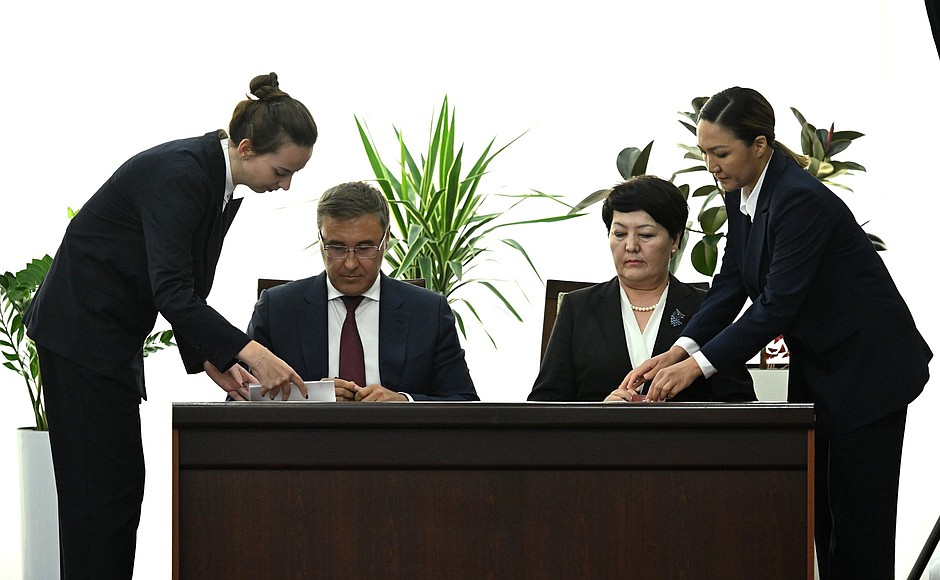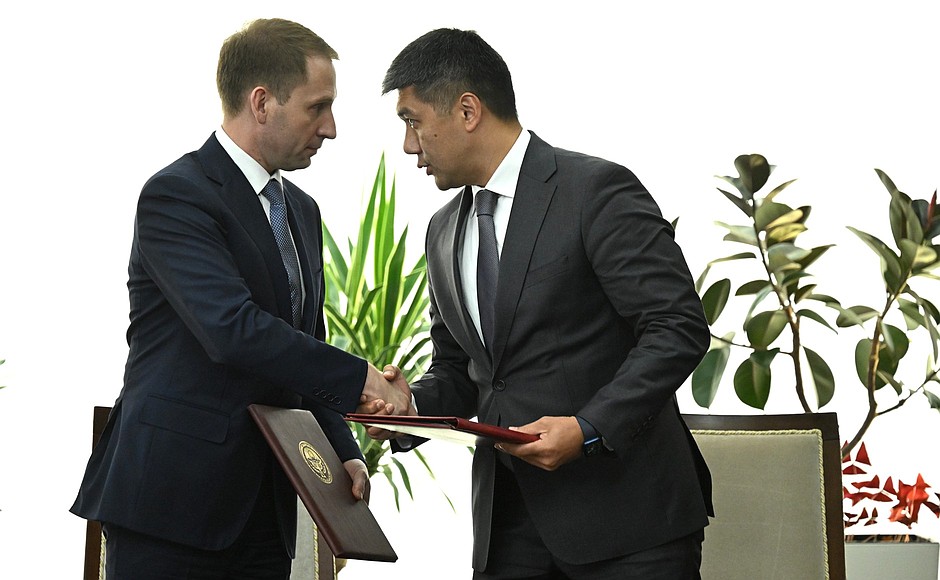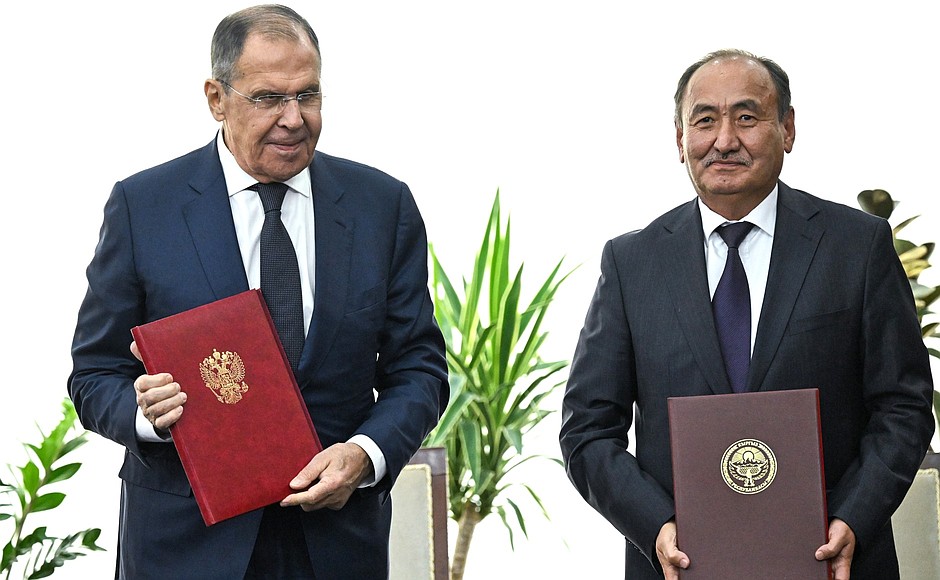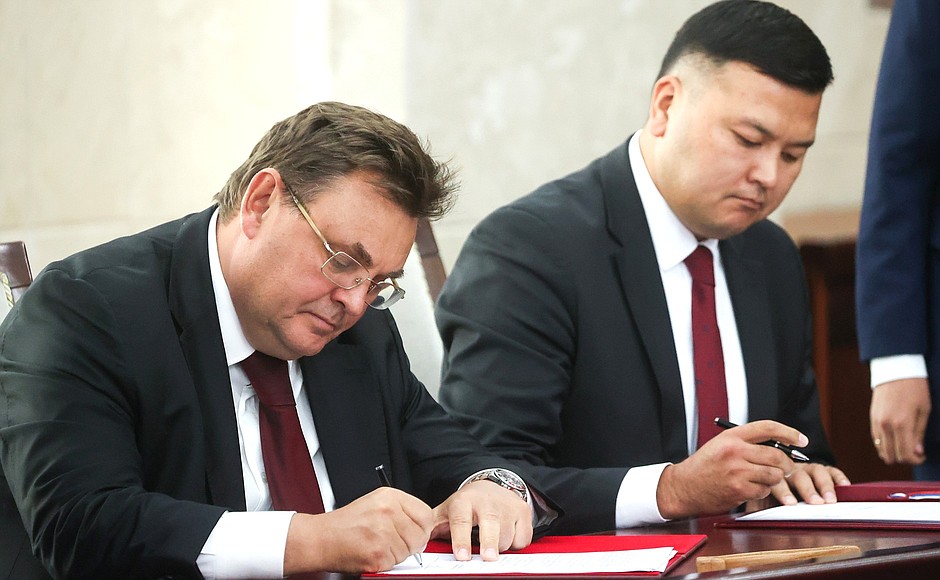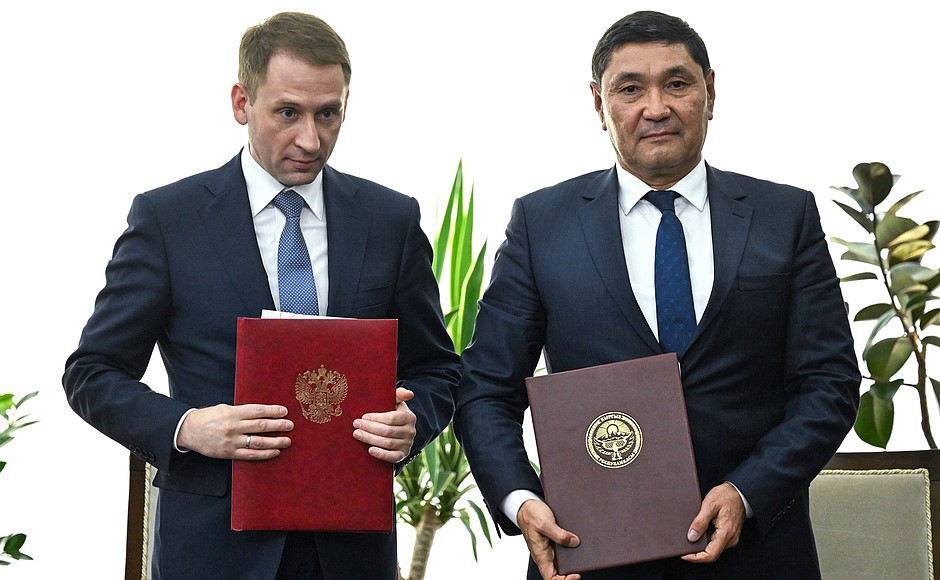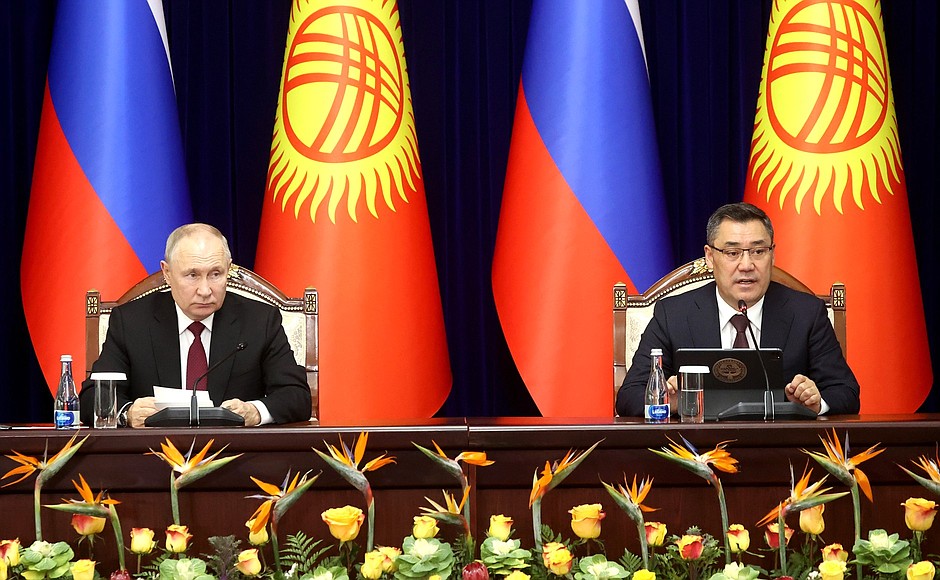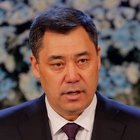Among the documents signed at the ceremony were an intergovernmental agreement on the terms of operation of the Kyrgyz-Russian Slavic University in Bishkek, an agreement on cooperation between the two countries’ ministries of justice, an intergovernmental memorandum of understanding on ensuring biological safety and interdepartmental memorandums of understanding in forestry development as well as environmental and natural resources protection.
* * *
President of Kyrgyzstan Sadyr Japarov: Ladies and gentlemen,
I am happy to welcome President of the Russian Federation Vladimir Putin on an official visit to Kyrgyzstan.
I am delighted that President Putin has returned the official visit I made to Russia five months ago. It is yet further proof of the strong interstate relations between Russia and Kyrgyzstan.
I would like to note with satisfaction that the agreements reached during our meeting in Moscow are being implemented.
President Putin and I held substantive talks on current aspects of bilateral and multilateral cooperation between our countries, which are strategic partners. We reaffirmed our strong commitment to stimulating and expanding our bilateral cooperation. Evidence of this is the bilateral documents we have signed.
We share the opinion that trade between our countries is below our countries’ potential. In this connection, we agreed to take measures to increase mutual trade and to strive for the ambitious target of $5 billion.
During our talks, we highlighted cooperation in investment, fuel and energy, as well as agriculture. We have decided to intensify the efforts of our governments towards economic diversification and the implementation of major investment projects aimed at boosting our economic interaction.
Today we also pointed out the importance of using bilateral mechanisms, in particular, the Intergovernmental Commission for Trade, Economic, Scientific, Technical and Cultural Cooperation and the Russian-Kyrgyz Development Fund, in the interests of our countries’ development.
I would like to note with satisfaction the positive results of the 10th Kyrgyzstan-Russia Interregional Conference on Industrial Cooperation, which took place in Jalal-Abad yesterday and included representatives of the regions and business communities of our countries. I would like to emphasise that this platform is highly popular and has great potential. It is gratifying to note that the conference led to the signing of documents and contracts exceeding $3,5 billion.
I would also like to note that we place great emphasis on expanding cultural and humanitarian cooperation with Russia. In this regard, I would like to note the role of the Kyrgyz-Russian Slavic University, which has become one of the leaders in higher education and science in Kyrgyzstan over the past 30 years. Since its inception, the university has produced a large number of highly qualified specialists now working in Kyrgyzstan, Russia and other countries.
It should be noted that Kyrgyzstan’s chairmanship in the Commonwealth of Independent States coincided with the Year of Russian as the Language of Interethnic Communication in the CIS. The city of St Petersburg was also announced the cultural capital of the CIS in 2023.
We also discussed the celebration of the 95th birth anniversary of Chingiz Aitmatov, an outstanding writer, on a global scale.
Speaking of security, we noted the positive role of the joint Russian military base in Kant and spoke in favour of strengthening cooperation in the fight against international terrorism, extremism, drug and arms trafficking, cybercrime and other forms of transnational organised crime, both bilaterally and at international organisations.
Cooperation between Kyrgyzstan and Russia in the EAEU has particular relevance. We will make every effort to further deepen integration processes and achieve the goals of the union.
The results of this visit inspire optimism about the further development of Kyrgyz-Russian relations.
It is with great pleasure that I now give the floor to our dear guest, the President of Russia.
Please, Mr President.
President of Russia Vladimir Putin: Mr President, colleagues. Ladies and gentlemen,
I fully agree with President Japarov: today's talks indeed took place in a friendly and constructive atmosphere. They were also very productive – our colleagues talked to each other, and almost all of the participants spoke and made their proposals for the development of our cooperation.
We substantively discussed the entire range of bilateral ties, as well as current regional and international issues. An extensive package of interstate and interdepartmental documents has been prepared for the visit. You have just seen the signing ceremony for them.
When discussing trade and economic partnership, we all noted with satisfaction that last year, bilateral trade increased by 37 percent and reached a record high of $3.4 billion, and added almost 18 percent in the first half of this year. And I fully agree with my colleague, the President – we certainly have good prospects for further growth.
Our countries are quickly shifting to national currencies in bilateral trade and building stable channels of lending and banking cooperation. As a result, the share of the ruble in counter commercial transactions reached an impressive 83 percent.
Russia is the biggest investor in the Kyrgyz economy. One third of all direct foreign investment in the country comes from Russia. There are some 800 Russian-Kyrgyz enterprises engaged in such key sectors as energy, mining, machine-building, agriculture and transport that are successfully operating in the republic.
Important support to the Kyrgyz economy is being provided by the bilateral Development Fund, completely financed by Russia. Through the Fund, some $520 million was invested in over 3,000 joint projects in the real sector of the Kyrgyz economy. I want to note that as of late, these projects, with the direct involvement and support of the President of Kyrgyzstan, have become sustainable in a major way, which is very important for the development of the republic’s economy.
The bilateral intergovernmental commission, whose regular meeting took place in Bishkek this March, is operating and achieving good results.
As it was already said, Jalal-Abad yesterday hosted the 10th anniversary meeting of the Russia-Kyrgyzstan Interregional Conference, which brought together heads of regions and municipalities, ministries, agencies and parliamentarians, as well as business, expert and civic representatives from the two countries.
President Japarov and I have sent video greetings to the conference participants and praised the practical role that our multifaceted interregional cooperation plays in strengthening interaction between the two countries.
I want to note that Russia and Kyrgyzstan are closely cooperating within the Eurasian Economic Union; along with other member states, we are working on creating common markets of goods, services, capital and labour.
It is obvious that Eurasian integration yields undeniable dividends to all participants in the process, including, of course, Kyrgyzstan. For instance, in the past eight years since the republic joined the EAEU, its GDP and industrial output has increased by 130 percent. Exports have doubled.
It was emphasised during the talks that energy is among the most important spheres of Russian-Kyrgyz cooperation. Our country is the primary supplier of petroleum products to Kyrgyzstan. We fully cover Kyrgyz consumers’ needs in gasoline and diesel fuel. Last year, we exported nearly 1.2 million tonnes of fuel, and we plan to supply as much by the end of this year. These supplies are carried out on concessional terms free of export duty, which also has a direct economic effect for the Republic and economic operators.
Gazprom is instrumental in providing help to the Kyrgyz government’s gasification programme and has already invested 18 billion rubles in Kyrgyzstan’s gas supply system covering 30 percent of the Kyrgyz territory with gas supply infrastructure. We are aware that the President of Kyrgyzstan has set a goal for all participants in this process to cover 60 percent of the territory, and we will be there to contribute to this effort.
Bilateral industrial cooperation is expanding. With Russia’s participation, the Talas Gold Mining Complex was built and put into operation at the Jerooy deposit in northwestern Kyrgyzstan. Joint production of monocrystalline plates for solar power stations is currently in progress in Kyrgyzstan.
Today, President Japarov and I focused on expanding bilateral military and defence industry cooperation. In a short while, we will participate in a ceremonial event dedicated to a significant milestone, namely, the 20th anniversary of the Russian airbase Kant.
This military outpost significantly strengthens the Republic’s defence capabilities, ensuring security and stability throughout the Central Asian region and addressing acute challenges and threats such as terrorism, extremism, drug trafficking, and organised crime. Currently, the servicemen stationed at Kant are taking part in the Indestructible Brotherhood-2023 peacekeeping exercises conducted by the CSTO on Kyrgyzstan’s territory.
President Japarov and I were just talking about the founding of Kant, and I remember very well how this airbase was created. The Republic’s leadership directly approached the Russian Federation with a request to swiftly deploy our aviation wing here because Kyrgyzstan was under attack by armed groups, and many people were impacted, which required a rapid joint response. Today, this base has acquired a major status and regional importance.
Today we also mark another important anniversary, 30 years of the Kyrgyz-Russian Slavic University. This anniversary once again emphasises the multi-dimensional nature of the Russia-Kyrgyzstan partnership that extends to many areas, including, certainly, cultural and humanitarian affairs.
The Slavic University has 8,500 students from 20 countries. In 2023, Russia allocated around 450 million rubles for the university’s activities.
In addition to that, branches of Russian higher education institutions open in the Kyrgyz regions. There is a centre of the Lomonosov Moscow State University in Osh. A branch of Moscow State University will soon open in Karakol. More than 100 teachers from Russia were sent to Kyrgyzstan this year as part of the Russian Teacher Abroad project. We understand that it is not a sufficient number and the President of Kyrgyzstan has goals that are more ambitious – and we fully support this and will move in this direction.
I want to mention that overall, 16,000 Kyrgyz students study in Russian universities, including around 7,000 who study tuition-free.
Russia also helps Kyrgyzstan to develop its Russian-language secondary education system. I should mention that on September 1, President Japarov and I launched the construction of three Russian-language schools – in Bishkek, Batken and Karakol. In the next few years, we plan to build nine Russian-language schools in all seven regions and in the two biggest cities, for more than 11,000 pupils.
When we exchanged opinions on the most topical regional and global issues, we confirmed that Russia and Kyrgyzstan have close or overlapping positions, as diplomats like to say. Our countries coordinate their work within the UN and other leading international platforms, including the Shanghai Cooperation Organisation and the Commonwealth of Independent States whose summit we will attend tomorrow.
Finally, I would like to express my sincere appreciation to our Kyrgyz friends and President Japarov for our productive work together. I am confident that the results of this visit will help the allied relations between Russia and Kyrgyzstan continue to progress, and will certainly benefit all citizens of the two countries.
Thank you very much.
